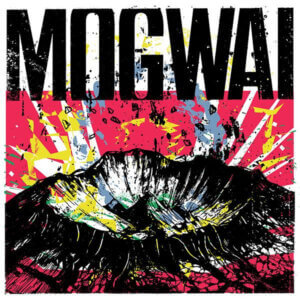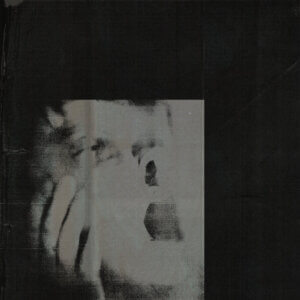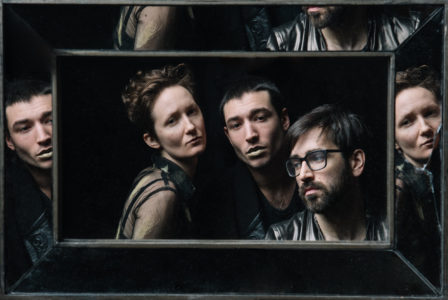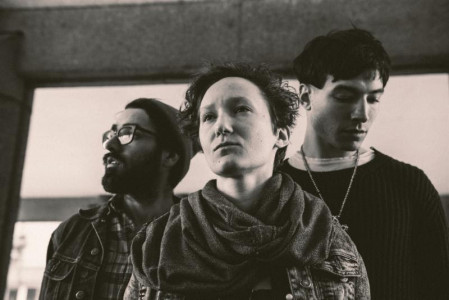Sons of an Illustrious Father move beyond

SONS OF AN ILLUSTRIOUS FATHER MOVE SLOWLY BEYOND NIKOLA TESLA
In these trying times, Sons of an Illustrious Father have the kind of fervent attitude and spirit that modern music can’t have enough of right now. Comprised of singers/multi-instrumentalists Ezra Miller (who you may also recognize through his acting career), Lilah Larson and Josh Aubin, the NYC-based trio make music that is highly political, musically diverse (or as they call it, genre-queer), boundary-pushing and unflinchingly earnest – all in varying doses. We caught up with all three members ahead of the June 1 release of their newest album Deus Sex Machina; or, Moving Slowly Beyond Nikola Tesla, where we discussed their songwriting process while jumping between instruments, turning surf punk tunes into eight-minute epics, happy accidents, and tinnitus.
Northern Transmissions: You’ve called your album Deus Sex Machina; or, Moving Slowly Beyond Nikola Tesla. What was the inspiration for the album title being two titles in one, and what does it mean to you with regards to the project itself?
Ezra Miller: It goes like this – what is expressed is something indescribable, something I wouldn’t hesitate to call divine. When we make art, what is expressed is beyond our understanding. How we express it is through the vehicle of our bodies, which is all that we have. In turn, how does it come to light in the world, and how do you hear it?… It’s through the extensions of ourselves that we in turn created. Instruments, first and foremost, then recording sounds – the vast digital network through which things are made, and the phones we’re talking through now. That’s the Deus, the Sex and the Machina of Deus Sex Machina. It’s sort of a meditation on channels and frequencies that pass through those channels, and the master of frequency, of course, Nikola Tesla. [He] was betrayed by the world; it didn’t accept Nikola Tesla’s brilliance and everything that he was trying to be a channel for into our world. We chose this means of generating and channeling energy that’s left humanity now in the most serious pickle.
NT: You’ve described yourselves as starting out as “a band with a process” when making music, where you’d write songs individually before you eventually started writing together more often. With that in mind, how did the songwriting process manifest itself with this new LP?
Josh Aubin: A little bit of both. We still had stems that we brought to each other. We also spent a lot more time in the studio recording together in the beginning phases of this album’s creation. A lot of the songs lent themselves to that simultaneous recording and songwriting process, coming as well from stems of songs that we created individually in different spaces.
EM: This is definitely the first album wherein you find songs where different people wrote different parts of one song. That evolution of being more collaborative, even in the beginning stages of the process, is definitely evidenced in this album.
NT: The three of you each play various instruments, and you all take turns singing lead. How is it decided during your songwriting process who gets to sing and play what on each song? Is it dependent on the individual ideas each of you bring to the equation?
Lilah Larson: Often we’ll conceive of parts for one another. We’ll hear someone singing a certain part on one of the songs that we’re primarily crafting. But also, many times we’ll be in the rehearsal process and something won’t quite be clicking, and we’ll decide to switch instruments and switch parts and see if that feels more right – and often, it does!
EM: For instance, background vocals are something that – almost entirely through our band’s history – have happened spontaneously during the rehearsal process [while] in a mode of exploration, hearing the song and responding to the song.
NT: Ezra, given your career as an actor, not to mention other musical projects from Josh and Lilah, how do you make time to keep the musical fire burning between each of you? Do you put time aside well in advance to jam or have band practice, or do you find yourselves sending files to each other back and forth via email or Dropbox like some bands who can’t always necessarily be together tend to do?
EM: We do it all in person for the most part. Sometimes when we’re mixing, there’ll be a process via email where we’ll look through notes and listen to stuff at that stage. But we really value the familial, physical space that we create with each other, and we definitely dwell in it to make art. There have been a couple times where someone’s sent an idea or a stem of something, but we haven’t ever really found a rhythm outside of physically being in each other’s presence to write music. We really strive to make time in all of our schedules to devote to this project.
NT: The longest track on your new album is Narcissus, which clocks in at almost eight minutes…
LL: Jesus, does it really?
EM: Woo!
NT: It also contains some heavy electronic influences with the drum programming, not to mention a pretty kickass sax solo toward the end. What went into the creation of this song in particular?
LL: (laughs) That song actually perhaps had the most interesting songwriting process. It was originally written years ago as a very straightforward surf punk song. I think we kind of lost interest in it because it was so straightforward. When we were in the studio recording this album, we decided to completely disassemble it and put it back together piece by piece. That started with the drum machine, then the bassline was added, and it was collaged from there.
EM: And the result you have before you is the eight-minute work you’re referring to!
LL: You know, pop music!
EM: There could’ve been a longer version, honestly! I mean, we did a lot of sessions with it that were just long, hypnotic trance sessions, where that drum machine just played for hours. We were all lying on the floor…
JA: Every time we put a track on it, we would just play a little longer.
EM: It’s true (laughs)!
NT: The closing track on this new album, “Samscars”, starts with a spoken word sample of what sounds like a priest introducing the musical portion of a church service. Is that what it is?
LL: That’s actually radio interference coming through my guitar.
EM: That would be the Deus Sex Machina of the Deus Sex Machina. That really happened.
That’s in real time. So it’s not a sample…
LL: It’s the guitar track.
EM: It’s not something we added, it’s on the guitar track. That happened spontaneously. We heard little cracklings and whispers, and then…
LL: And then we all looked at each other and waited for the right moment to begin.
EM: Yeah, and that guy showed up, and announced the sermon… That is a true story.
NT: What led to you deciding to use that sample, and especially for the closing song?
EM: It actually informed everything about all of the other decisions we made for the album, and it partially inspired the name of the album. There was an idea throughout the whole process, I think largely as a result of us being what we often describe as being “unsupervised” through [it.] We made this album unlike our last one, which we made with Montreal’s own beloved, incredible Howard Bilerman. We made this album mostly alone – Lilah engineered most of the album when we laying down all of the basic tracks in London. Oliver Ignatius, who’s an incredible producer and engineer, stepped in later. He’s also our very good friend – he’s like one of us – so we were still in many ways unsupervised. One of the things we’ve always loved so much in the recording process is these glitches, these so-called mistakes or accidents that will show up on a track or that occur, and that can end up being the greatest things you do in a recording process – because, like most art, you don’t do it. That was one of the many on this album that, because we were in this so-called unsupervised space, we were just like, “Yay! Leave it in! No one to stop us!”
NT: The opening track “U.S. Gay” was written about the Orlando Pulse shooting in 2016. Given how you’ve discussed topics like gender, LGBTQ+ issues, and smashing patriarchal norms in other songs, and given how you say this album is a “technological and sociopolitical response” to our current reality, how much hope do you have for the not-too- distant future especially given the times we’re currently living in and the public’s responses to these times?
EM: No hope! Only prayer, determination, willingness, and the similitude of resistance and acceptance.
NT: Now that you’ve become a band that makes what you call “heavy meadow” or “genre- queer” music, what comes to your mind when you think of when you had those loud, punk- inspired jams in Ezra’s parents’ basement back in the day and looking back on that as the band you’ve become now?
EM: Hearing damage. I think about tinnitus. Honest answer (laughs). I wish we’d worn more ear protection back in those times. Kids, wear ear protection!
LL: Protect your ears.
EM: No, it’s undeniably not as punk rock as not wearing ear protection. But you know what’s too punk rock? Having tinnitus.
LL: I often imagine our childhood selves smiling at us from the past, being proud and satisfied. Not complacent, but excited.
EM: Yeah, and sneering, saying “Ha ha, you have tinnitus and I don’t!”
Words by Dave MacIntyre
Latest Reviews
Tracks
Advertisement
Looking for something new to listen to?
Sign up to our all-new newsletter for top-notch reviews, news, videos and playlists.







